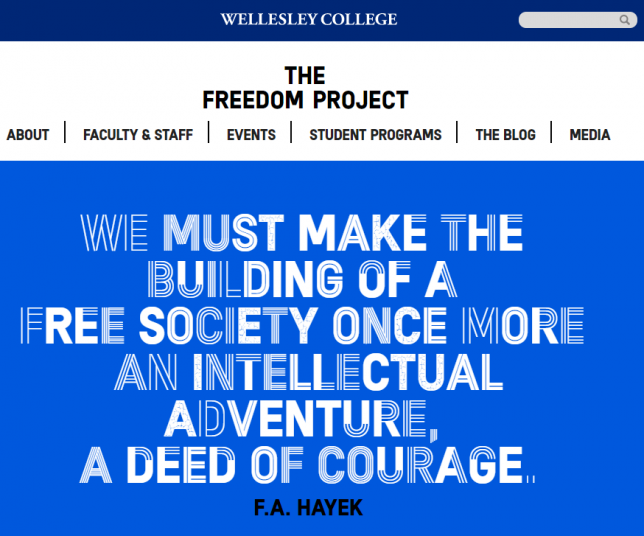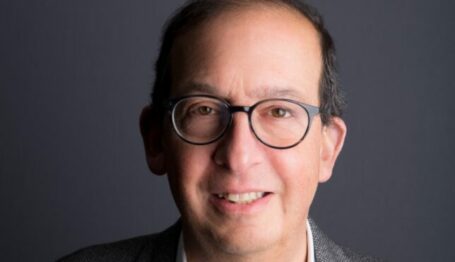Philanthropy
How the Author of “Dark Money” Killed the Freedom Project
 Freedom Project home page
Freedom Project home page

Editor’s Note: As Ms. Mayer has pointed out, Capital Research Center has received Koch funding in some of our 34 years (although not in 2016, 2017, or 2018). That funding has never been as much as 10 percent of our total funding and more typically less than 1 percent. We have also had the pleasure of hosting participants from both the Koch Internship Program and the Koch Associate Program.
Many people on the Right take for granted that all elite colleges are bastions of illiberalism where students are coddled with safe spaces and trigger warnings. Students are rarely (if ever) confronted with uncomfortable ideas in class, and they often leave college with a worthless degree. That is a very real possibility at many of our nation’s institutions of higher education, especially as curricular standards continue to be sacrificed on the altar of identity studies and competency-based curricula. However, even on the most illiberal of campuses, there exist Oases of Excellence—privately funded academic centers that pride themselves on providing students with a balanced education.
One such program was the Freedom Project at Wellesley College. Funded in part by the Charles Koch Foundation, the Freedom Project served to bring intellectually diverse academics to campus for lectures and debates. Students who participate in the program have the opportunity to present at academic conferences, attend seminar-style classes, and participate in valuable internship programs. But the question of academic merit fell by the wayside this year.
The director of the project, Dr. Tom Cushman, delivered a presentation on the success of the Freedom Project at the annual meeting of Koch-affiliated donors in Palm Springs earlier this year, drawing the ire of students and the media. How could the famously liberal women’s college (and Hillary Clinton’s alma mater) allow the Koch Foundation to threaten the college’s academic freedom or the very safety of its students?
Some of the scholars invited by Cushman included feminist-cum-Title IX-critic Laura Kipnis from Northwestern University and liberal author and bioethicist Alice Dreger. Dr. Cornel West of Harvard University, honorary chair of the Democratic Socialists of America, was slated to speak as well. (He would be sharing the stage with his good friend and noted conservative thinker, Dr. Robert George of Princeton University.) This is not a lineup of dyed-in-the-wool Republicans. On the contrary, these are self-proclaimed feminists, democratic socialists, and a conservative who is sharply critical of President Trump. But—according to the criticism levied at Dr. Cushman—their research questions the illiberal orthodoxy and their engagement with the right-of-center “normalizes” violence and bigotry. Perhaps worse, they were brought to campus with Koch money, and therefore, must have internalized misogyny or a secret stealth agenda.
On many occasions, Cushman defended his program by appealing to the academy’s better angels. In addition to hosting provocative scholars, the program hosted a handful of Scholars at Risk. These academics hailed from countries where they could be imprisoned or killed because of their views or research. What’s not to like about offering sanctuary to refugee academics?
Wellesley’s administration managed to uphold the Freedom Project’s academic freedom, even as students protested speakers and donors threatened to stop giving to the college. Despite the “controversy,” plenty of Wellesley alumni also contributed to the Project. The program was also very popular with a wide swath of students.
But then Jane Mayer joined the fray.
In a story for the Boston Globe, Dr. Cushman was asked if the project would be willing to invite New Yorker investigative reporter Jane Mayer to speak. Ms. Mayer’s 2016 book, Dark Money, is highly critical of conservative and libertarian philanthropists. Charles and David Koch are two of her favorite targets. Dr. Cushman responded that he would not be inviting her because of her shoddy scholarship. (Just one example cited by CRC’s president Scott Walter in a review published in Philanthropy magazine notes how Mayer wrote that “a few” of the biggest donors in the 2014 election cycle were Democrats. But when you check her endnotes and original source, you find that the source reported 52 of the top 100 individual donors in the cycle were Democrats.)
Ms. Mayer stirred up outrage on Twitter, claiming that Dr. Cushman was guilty of “banning” her from campus. She accused Cushman of attempting to protect the Kochs by censoring her, even though she is not entitled to a platform at Wellesley or any other college.
In response, Dr. Cushman went so far as to invite another academic critical of the Koch’s philanthropy to speak. Alexander Hertel-Fernandez’s academic research met the Freedom Project’s higher standards and would have provided a stronger case against the Freedom Project’s funders. This can hardly be construed as protection.
Wellesley’s administration paid little heed to nuances and principles. Instead of acknowledging this compromise to invite Prof. Hertel-Fernandez, it caved to the voices of intolerance, who objected to the mere appearance of Koch money or influence on their campus. (Inconveniently, it has been pointed out that Mary Robinson Koch, mother of the billionaire philanthropists, attended Wellesley and donated to the school’s financial aid fund. That means any student who receives need-based aid is also guilty by association.) The Globe recently reported that the Freedom Project will be undergoing review or restructuring; Dr. Cushman has announced he’s going on sabbatical.
Depending on how the grant from the Koch Foundation was structured, this could mean the end for the Freedom Project. It is doubtful that a new director or compromised mission for the Project would still honor Charles Koch’s intent to promote intellectual diversity, given the way Wellesley refused to support Dr. Cushman. And so another beacon of academic freedom has been banished from yet another college campus. Jane Mayer and the UnKoch My Campus movement have emerged victorious, even as they hypocritically use their own network of influencers and funders to maintain the status quo in academe.


